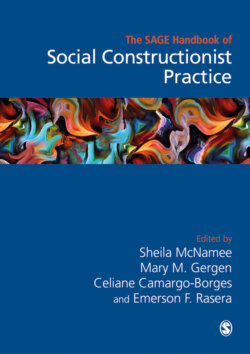Читать книгу The Sage Handbook of Social Constructionist Practice - Группа авторов - Страница 145
На сайте Литреса книга снята с продажи.
References
ОглавлениеBarad, K. (2007). Meeting the universe halfway. Durham, NC: Duke University Press.
Bateson, G. (1972). Steps to an ecology of mind. New York, NY: Ballantine.
Beck, A. T. (1979). Cognitive therapy and the emotional disorders. New York, NY: Plume.
Braidotti, R. (2013). The posthuman. Malden, MA: Polity.
Clarke, A. E. (2005). Situational analysis: Grounded theory after the interpretive turn. Thousand Oaks, CA: Sage.
Clarke, A. E., Friesen, C., and Washburn, R. S. (2017). Situational analysis: Grounded theory after the interpretive turn (2nd edition). Los Angeles, CA: Sage.
Deleuze, G., and Guattari, F. (1988). A thousand plateaus (B. Massumi, Trans.). St. Paul, MN: University of Minnesota Press.
Dreier, O. (2008). Psychotherapy in everyday life. New York, NY: Cambridge University Press.
Dreyfus, H. L., and Dreyfus, S. E. (1986). Mind over machine: The power of human intuition and expertise in the era of the computer. New York, NY: Free Press.
Duff, C. (2013). Assemblages of health. New York, NY: Springer.
Foucault, M. (2011). The government of self and others: Lectures at the Collège de France, 1982–1983 (G. Burchell, Trans.). New York, NY: Picador.
Fry, H. (2018). Hello world: Being human in the age of algorithms. New York, NY: W. W. Norton.
Garfinkel, H. (1967). Studies in ethnomethodology. Englewood Cliffs, NJ: Prentice Hall.
Gergen, K. J. (2015). From mirroring to world-making: Research as future forming. Journal for the Theory of Social Behaviour, 45, 287–310. doi: 10.1111/jtsb.12075
Goffman, E. (1967). The interaction ritual. New York, NY: Parthenon.
Grosz, E. (2017). The incorporeal: Ontology, ethics and the limits of materialism. New York, NY: Columbia University Press.
Guattari, F. (1995). Chaosmosis: An ethico-aesthetic paradigm (P. Bains and J. Pefanis, Trans.). Sydney, AU: Power Publications.
Hacking, I. (1999). Mad travelers. Cambridge, MA: Harvard University Press.
Harré, R. (2009). Wittgenstein's therapies: From rules to hinges. New Ideas in Psychology, 27(2), 118–132. doi: 10.1016/j.newideapsych.2008.04.009
Hekman, S. (2010). The material of knowledge: Feminist disclosures. Bloomington, IN: Indiana University Press.
Heritage, J. (1984). Garfinkel and ethnomethodology. Cambridge, MA: Polity.
Heron, J., and Reason, P. (1997). A participatory inquiry paradigm. Qualitative Inquiry, 3(3), 274–294. doi: 10.1177/107780049700300302
Ingold, T. (2007). Lines: A brief history. New York, NY: Routledge.
Kemmis, S. R., Wilkinson, J., and Edwards-Groves, C. (2017). Roads not travelled, roads ahead: How the theory of practice architectures is travelling. In K. Mahon, S. Francisco, and S. Kemmis (Eds.), Exploring education and professional practice (pp. 239–256). New York, NY: Springer.
Latour, B. (2013). An inquiry into modes of existence. Cambridge, MA: Harvard University Press.
Lefebvre, H. (2004). Rhythmanalysis: Space, time and everyday life. (S. Elden and G. Moore, Trans.). New York, NY: Continuum.
Lock, A. J., and Strong, T. (2010). Social constructionism: Sources and stirrings in theory and practice. New York, NY: Cambridge University Press.
Massumi, B. (2015). Politics of affect. Malden, MA: Polity.
Mudry, T. (2016). Behaviour is in the practice: Examining excessive behaviours using a practice framework (Doctoral dissertation), University of Calgary, AB.
Nail, T. (2019). Being and motion. New York, NY: Oxford University Press.
Nicolini, D. (2012). Practice theory, work, and organization: An introduction. New York, NY: Oxford University Press.
Polanyi, M. (1966). The tacit dimension. Chicago, IL: University of Chicago Press.
Roemer, L., and Orsillo, S. M. (2010). Mindfulness-and acceptance-based behavioral therapies in practice. New York, NY: Guilford Press.
Schatzki, T. R. (2010). The timespace of human activity. Lanham, MD: Lexington Books.
Schegloff, E. A., and Sacks, H. (1972). Opening up closings. Semiotica, 8, 289–327. doi: 10.1515/semi.1973.8.4.289
Schüll, N. (2012). Addiction by design: Machine gambling in Las Vegas. Princeton, NJ: Princeton University Press.
Shotter, J. (2006). Dialogue, depth, and life inside responsive orders: From external observation to participatory understanding. In B. Goranzon, M. Hammaren, and R. Ennals (Eds.), Dialogue, skill, and tacit knowledge (pp. 243–266). New York, NY: John Benjamins.
Sloterdijk, P. (2013). You must change your life (W. Hoban, Trans.). Malden, MA: Polity.
Stengers, I. (2011). Thinking with Whitehead: A free and wild creation of ideas. Cambridge, MA: Harvard University Press.
Tomm, K. (1987). Interventive interviewing: II. Reflexive questioning as a means to enable self-healing. Family Process, 26(2), 167–183. doi:10.1111/j.1545-5300.1987.00167.x
Tomm, K., St. George, S., Wulff, D., and Strong, T. (Eds.) (2014). Patterns of interpersonal interactions: Inviting relational understandings for therapeutic change. New York, NY: Routledge.
Watson, J. B. (1925). Behaviorism. New York, NY: W.W. Norton.
